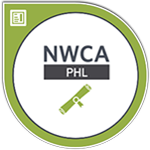PURPOSE
The Philosophy credential captures the essential competencies related to philosophy’s roots, its associations with critical thinking, concepts of self and identity, freedom of will, ethics, and social justice.
AUDIENCE
This credential is appropriate for professionals who require knowledge of philosophical concepts to support a career position including editors and journalists, teachers and community educators, political scientists, sociologists, government and Foreign Service professionals, paralegals, clergy, business managers, researchers, and other positions that require critical thinking and ethics foundations.
JOB/CAREER REQUIREMENTS
These credentials document competencies including overall knowledge of critical thinking, ethics, and principles of social justice. Though many of these positions require appropriate education at various levels, and additional training, a fundamental understanding of philosophy provides a foundation that supports many aspects of daily tasks and decision-making.
PHILOSOPHY WORKPLACE TASKS:
- Editors and journalists read and write content for publication, evaluate submissions, create story ideas, research facts for stories, and manage photo and illustrations for story support.
- Teachers and community educators research philosophy topics, develop curricula, present educational lessons, and evaluate learning.
- Political scientists research and study political subjects, collect and analyze data, monitor current events and policy decisions, evaluate effects of policies on the people, and present research.
- Sociologists research theories related to historical and social issues, collect and analyze data, report findings, and advise different groups on policy and sociological issues.
- Government and Foreign Service professionals devise and execute policy decisions that affect constituents.
- Paralegals research and document legal decisions and make recommendations to attorneys based on relevant case law.
- Clergy lead operational and administrative decision-making for churches, synagogues, or other religious entities, and plan religious education programs for congregations, and counsel individuals. • Business managers use critical thinking skills to assess business needs and make operational and strategic decisions for businesses.
EXAM STRUCTURE OVERVIEW
Number of Questions in Exam: 45
Total Time: 30 minutes
Overall Passing Score: 70%
(All sections require an individual passing score of 70%)

